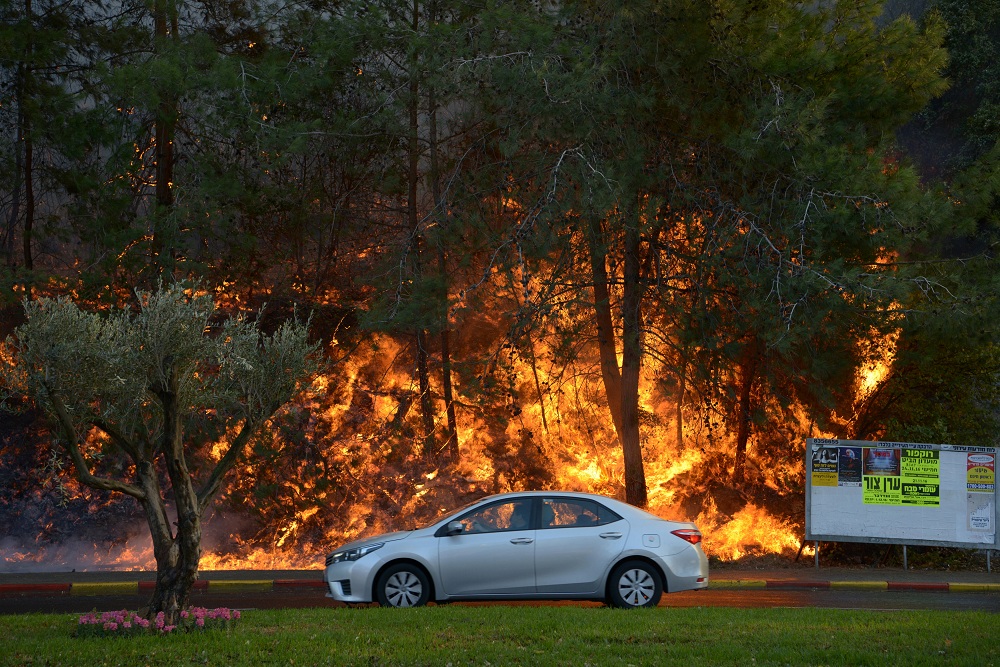Image: A car drives past burning trees as a wildfire rages in the northern city of Haifa, Israel November 24, 2016. REUTERS/Gil Eliyahu ISRAEL OUT. NO COMMERCIAL OR EDITORIAL SALES IN ISRAEL
Rami Amichai
HAIFA, Israel (Reuters) – Wildfires tore across central and northern Israel on Thursday, forcing tens of thousands of residents to flee the city of Haifa, as leaders blamed arsonists for some of the blazes and branded them terrorists.
Television pictures showed a wall of flames raging through central neighborhoods of Israel’s third largest city. Firefighters dowsed a petrol station with water as the blaze edged closer.
The fires have been burning in multiple locations for the past three days but intensified on Thursday, fueled by unseasonably dry weather and strong easterly winds.
“Every fire that was caused by arson, or incitement to arson, is terrorism by all accounts. And we will treat it as such,” Prime Minister Benjamin Netanyahu told reporters gathered in Haifa. “Whoever tries to burn parts of Israel will be punished for it severely.”
Internal Security Minister Gilad Erdan referred to “arson terrorism” and said there had been a small number of arrests, providing no other details.
On social media, some Arabs and Palestinians celebrated the fires and the hashtag #Israelisburning was trending on Twitter.
“It’s likely that where it was arson, it goes in the direction of nationalistic,” Police Chief Roni Alsheich told reporters, without going into further detail.
With fires burning in the forests west of Jerusalem, around Haifa, on central and northern hilltops and in parts of the Israeli-occupied West Bank, the government sought assistance from neighboring countries to tackle the conflagration.
Greece, Cyprus, Croatia, Turkey and Russia offered help, with several aircraft already joining efforts to quell the blaze, dropping fire-retardant material to try to douse the heaviest fires and stem their spread.
Netanyahu said he had asked for a “Super Tanker” fire fighting aircraft to be sent from the United States.
The Palestinian Authority had offered assistance as well, he said.
A thick haze of smoke hung over Haifa, which rises up from the Mediterranean Sea overlooking a large port. Schools and universities were evacuated, and two nearby prisons transferred inmates to other jails, a prisons service spokesman said. Patients were moved out of a geriatric hospital.
WORRYING FORECAST
A lack of rain combined with very dry air and strong easterly winds have spread the fires this week across the center and north of the country, as well as parts of the West Bank. Hundreds of homes have been damaged or destroyed but no deaths or serious injuries have been reported.
Education Minister Naftali Bennett, the leader of the Jewish Home party which supports settlements in the West Bank where Palestinians seek statehood, said on Twitter that arsonists were disloyal to Israel, hinting that those who set the fires could not be Jewish.
“Only those to whom the country does not belong are capable of burning it,” he said in a tweet in Hebrew.
Haifa’s mayor said he feared for the city and called on residents with water sprinklers to turn them on to help keep the flames at bay. Those leaving their homes were urged to go to sports stadiums and other safer locations.
Highway 443, which links Jerusalem and Tel Aviv as it cuts through a southern flank of the West Bank, was temporarily closed to morning rush-hour traffic as flames reached the city of Modi’in, about half way between the two conurbations.
Local weather forecasters have said the tinder-dry conditions – it has not rained in parts of Israel for months – and strong winds are set to continue for several days and they see little prospect of normal seasonal precipitation arriving.
“Meteorology is not responsible but it is conducive to the spread of these fires,” said Noah Wolfson, the chief executive of weather forecasting company Meteo-Tech. “The atmosphere will remain very dry, at least until Monday or Tuesday.”
(Additional reporting by Steven Scheer in Modi’in, Luke Baker and Ari Rabinovitch in Jerusalem; Writing by Luke Baker; Editing by Mark Heinrich and Andrew Heavens)
Copyright 2015 Thomson Reuters. Click for Restrictions.


